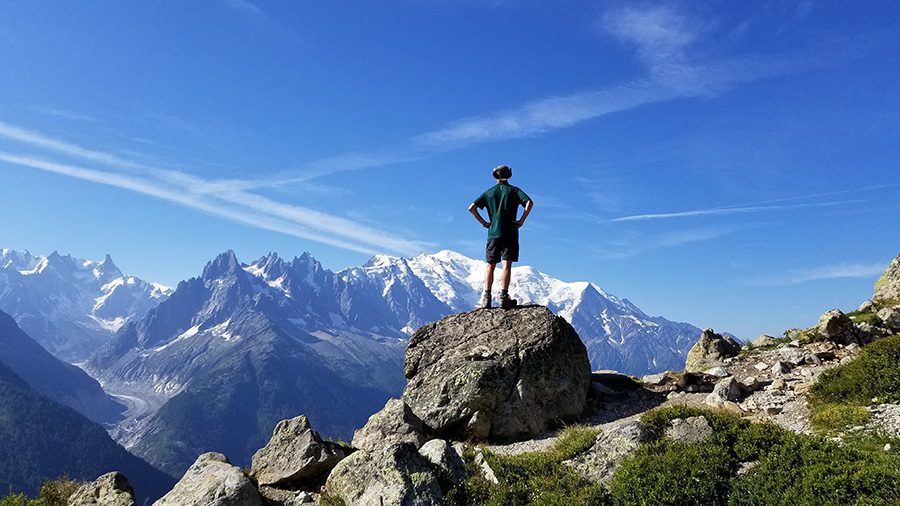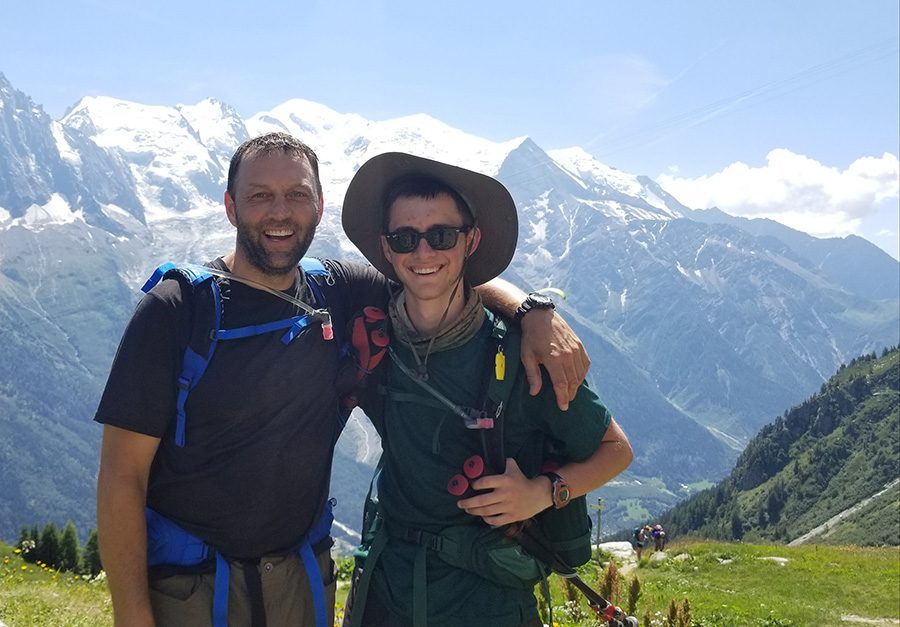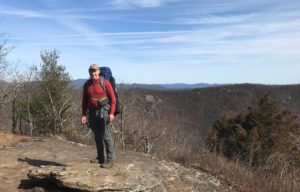Through the mountains and what I discovered there
In the mountains of France, I stand and face Mont Blanc. At the end of summer, my father and I spent ten days on a life-changing hike around this monumental mountain.
August 31, 2018
I stood on the border of two nations, wiping sweat from my brow with a dirty bandana. There was a blue sky above and green grass below. Ahead of me, across the valley that cradles the city of Chamonix, was a snow-capped mountain over 15,000 feet high. Its name was Mont Blanc. This is the story of how I walked around it.
Two Saturdays before summer ended, my father and I got on a plane and left the good ol’ U-S-of-A to participate in a hike known as the Tour du Mont Blanc, or TMB. The hike took us ten days and covered over 110 miles, passing through three different countries on the way. It was a journey that changed the way I think about the world, high school, and myself.
The trek began (and ended) in Chamonix, a French city situated at the base of Mont Blanc. Using our mountaineering skills, a compass, ten printed maps, Google Maps, hundreds of posted signs, and the advice of other hikers, we navigated through the clearly-marked hiking trails of the Alps. We spent each night in an exquisite village, town, or city, and slept in a hotel or refuge, each of which had clean water for bathing and drinking.
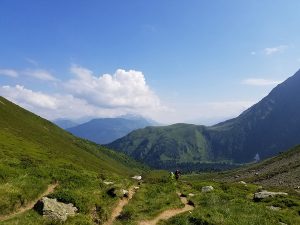
In the French Alps, hikers follow the Tour Mont Blanc trail towards the Col du Tricot. In the summer, the mountains are lush and green, with snow only remaining at the higher peaks.
I apologize if this ruins any rugged fantasy that we survived on our own in the wilderness with no assistance for over a week. Our trip was blessed by many luxuries, but each day the journey was still a physical and mental struggle. There wasn’t anything easy about the days we climbed up 3,000 feet of mountainside just to descend the same distance, or the days that the hiking lasted over eight hours because the distance was so great.
The indescribable elegance of the region we walked through cannot be overstated. It was spectacular. Every sight was the best I had ever seen. The snowy peaks of the Alps, the lush valleys below them, the multitude of glacially-fed streams, the rocky cliffs and the gently rolling hills all merged together into a portrait of wonder that you’d have to see in person to fully understand. I became an expert at whipping my phone out of my pocket, snapping several photos of the wondrous landscape, and then putting it away to take it all in. In ten days I had taken over 1,600 pictures. My dad took over 800 as he perfected the same technique.
The first valuable lesson the TMB had to teach me was perseverance. Even when you’re tired and sore, you can’t do anything but climb to the next peak, the next pass, the next town. There are few shortcuts on the trail, and each one you take deprives you of views you wouldn’t want to miss. It’s up to you to get yourself over each obstacle. No one else can climb it for you.
We would depart in the morning, with our day packs stuffed full of water, food, and emergency supplies. Sometimes the sun had yet to crest over the easternmost mountains, and the French or Italian or Swiss countryside would be sleeping in the last minutes of dawn. These mornings, the ones where we crept out of small towns like bandits, leaving no trace of our presence but footprints and a messy hotel room, were the most peaceful. The only sounds were the rhythmic crunches of our shoes on the path and the chirping of crickets.
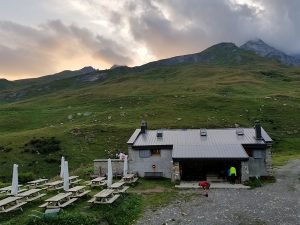
The sun sets behind the mountains at the Refuge Les Mottets. The Refuge’s kitchen and cafeteria, pictured here, was full of people from all across the world.
The sun would rise, and by then we were working our way up a mountain, or down a valley, or into the trees. The cluster of buildings that marked a specific village would end, and the trail would carve away from most signs of civilization. Other hikers would pass us, men and women of unknown national origin on their way somewhere grand, as we were. We would make eye contact, smile, exchange a quick “bonjour” or “bonjourno,” and part ways forever. Our lives were tangents, connecting once and never again.
Everywhere my dad and I hiked, we went together, often each other’s only company. We spent many hours discussing religion, school, politics, life, movies, books, plans for the future, the last night’s dinner, and countless other topics. We raised the questions that have no answer and took time to explore difficult subjects. We also spent just as many hours in silence, reflecting on our own thoughts, taking in the world around us.
On the trail, you have plenty of time to think. It’s the best distractor from any physical pains you might feel. My thoughts were often focused on the upcoming school year, the friends and family I had left at home, my future, my past, and how to reconcile the two. As the trip went on, the mountains worked their strange magic, and I grew inspired by their beauty. I began to spend more time thinking about how I could change for the better. I was ready to face problems I was previously too lazy or too scared to admit I had.
High school sucks. It’s a confounding paradox, somehow simultaneously the worst four years of your life but also the golden years of youth. All you want is for it to end, but you know you’ll miss some aspects of it. Out in the “wild,” I truly faced for the first time that these years would soon be behind me. And when it came down to it, I wasn’t satisfied by what I had done in high school so far. I had gotten caught up in trying to survive each day, trying to reach graduation, that finish line that’s secretly a starting line. There’s a lot I still want to do before I kiss Fayette County goodbye forever.
Seventeen years had passed me as quick as a heartbeat. Had I done anything during that time that wasn’t solely for my own benefit or satisfaction? Twice on our journey we climbed steel ladders up the face of a mountain. A fall off of one would be deadly. Working my way up, I couldn’t help but wonder: if my hands slipped on the next rung, and I returned home in a box, what would I be remembered for?
I know, it’s quite morbid. But it was an important question. I knew in those moments, the moments of greatest danger, that I had no desire to die before I did more. I resolved myself to return home and make my world a better place, and I climbed each ladder without any incident. I returned home safely, and I hope I returned a little better off than when I left.
The next great lesson to bring home was that our world is bigger than our views of it. It seems obvious at times, but often it’s easy to get caught up in all the little problems life throws your way. So often we climb our metaphorical mountains just to realize they were molehills, and we see that our oceans were lakes. The world does not end at the borders of our little bubble. It goes on. Every challenge we face here will one day be behind us, and a magnificent, enormous world lies ahead. As students, we can’t lose hope before seeing how much the Earth has to offer.
Some say it’s a small world. They’re wrong. No one could ever hope to see every inch of the Earth, with its near-infinite number of hidden secrets and wonders. The Alps are dotted with hidden corners where people have lived their entire lives, never once caring if we know they exist.
An ocean away, a foreign culture operates deep within the mountains. A mountainside refuge is operated by the same family that has owned it for generations. Down the trail, a farmer tends to a herd of cattle. In the cities, more ‘modern’ citizens go out for a drink after a long day. The people of the Alps have been hardened by the struggles of living in a mountainous climate. It was my pleasure to witness just a piece of what their lives are like.
I guess that’s what it comes down to. The most important part of the trip, the most important part of everything, really, is people. The people we meet are gifts given to us by circumstance. Every passing stranger was an opportunity to learn something new, to share a story, to hear about a life drastically different from my own. We never passed up an opportunity to do so, no matter where we were.
A group of fellow hikers walked the TMB as we did, and we spent many days in their company, discussing our homes and our shared world. Some were British, some Scottish, a lone Irishman, and a few Americans. They were all adults, and they had more experience and wisdom than anyone my age could hope for. As I said before, our lives were but tangent to each other. Knowing our time together was short, I made the most of every second. It occurred to me that the same was true for my friends back home. You never know when the last time you’ll speak to someone will be. With the end of school in sight, I was suddenly afraid of a future without the same people I’ve known and loved for years beside me. I still am.
In another continent, discussing the mysteries of life with total strangers, sharing meals with hikers from places I’ll never see, I realized high school’s pettiness, its clique-ish culture of gossip and rumor, is laughingly pathetic. Holding grudges, spreading lies, making sarcastic comments about people you look down on, it’s all childish. Out in the world beyond our school’s halls, no one has the time or energy for it.
I had two dinners in France and Italy in a refuge’s massive cafeteria, where I ate amongst total strangers. Similar to the cafeteria at school, there was a steady roar of conversation. Everyone’s voices overlapped and intermixed as people exchanged jokes, questions, and stories. Also like school, the men and women in the refuge were all different from each other, with various backgrounds and life experiences.
But here the similarities end. In the refuges on the TMB, in the presence of so many strangers, there was no judgement. No fear of rejection. I was the youngest person at my table by at least a decade, but I was spoken to respectfully by everyone there. I knew I could sit down at a different table and start a conversation with anyone, and they would listen to me, and I would listen to them, and we could be honest in the way only strangers who know they’ll never see each other again can be honest. The only barriers we could possibly face would be those of language. At school, trying to sit down at a table of strangers and ask about their life would be social suicide; the best result you could hope for would be fearful silence.
After three weeks back, these are memories I miss most dearly. When no one knows you, you can be anyone. In your home town, the past is ever-present. It would be wonderful to rid my generation of immaturity now, so that we could interact with less shame. The only way to do it is to rid it from yourself first. My greatest fear is that I’ve learned nothing from all this, and that once again I am contributing to high school’s dry routine and distasteful social experience. Time will tell.
In the final moments of my hike, I was tired, sweaty, and a little dehydrated. My legs were weary from the thousands of steps behind me. At the end, back where I started, I began. The finish line was a starting line. I adjusted my backpack and readied myself for the long journey ahead, sure it would be a good one.


